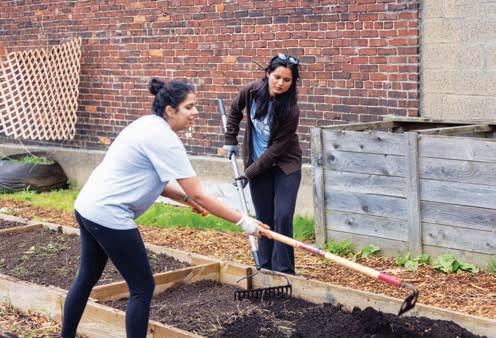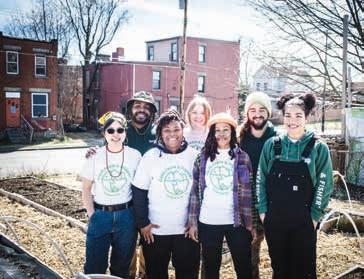
2 minute read
Creating an Oasis in the Food Desert

by Martin Miron
Advertisement
The Oasis Project (TOP) focuses on economic mobility education, employment, entrepreneurship and the physical environment. Their Oasis Farm & Fishery (OFF) is a unique Black-led urban market garden in the Homewood neighborhood. It was designed to be a literal oasis for local residents with the revitalization of four vacant lots into an off-grid, aquaponic (indoor fishery) and hydroponic (soilless) laboratory, an outdoor classroom, a playground, an edible park and green spaces that are all accessible to the public. Bible Center Church (BCC) was founded and led by Ralph and Bernice Groce from 1956 to 2003. In 2004, their grandson, Dr. John Wallace, returned to Pittsburgh, and he and his wife, Dr. Cynthia Wallace, assumed leadership. Under their leadership, TOP was launched in 2011 as the community and economic development division of BCC to ad- dress the immense disparities in opportunities and outcomes for young people and promote the positive development of the racially and economically segregated neighborhood of Homewood and its contiguous communities.
The University of Pittsburgh Katz Business School and the Business of Humanity Project began collaborations with TOP in 2016 to build the bioshelter adjacent to administrative offices along Fleury Way. Upon opening, the building became the official home of OFF. The current facility is equipped as a direct current-powered greenhouse that stores 1,750 gallons of reclaimed rainwater. Next door is a hoop house-style greenhouse capable of extending the growing season into cooler months. Other amenities include a 24-panel solar canopy, an outdoor kitchen equipped with a brick pizza oven, an outdoor classroom, a straw bale garden, an edible park, a satellite farm and an African American heritage garden.
OFF Director of Farm and Education, Tacumba Turner, is an African American farmer and educator who is dedicated to connecting learners of all ages, activists, institutions and community partners in their efforts to grow a richer future where people are empowered to feed themselves while improving the environment around them. OFF grows staple vegetables that are well-suited to the growing conditions of Southwestern Pennsylvania such as salad greens, tomatoes, peppers, squash and more. They also specialize in nutritional, hard-to-find produce that honors the Afro/ Black, Indigenous and Afro/Indigenous population by teaching about pre-colonial foods and lifestyles.
In 2022, Oasis Farm & Fishery produced a milestone harvest of more than 100 pounds of fresh produce picked in one day that totaled 1,630 pounds counting the Homewood Food Access Working Group.
Food produced at OFF is distributed through a Deeply Rooted Veggie Share CSA subscription box service and at the Homewood Farmer’s Market every Saturday from 10 a.m. to 2 p.m. outside Everyday Café at 532 North Homewood Avenue. People can subscribe to the CSA at OasisFarmAndFishery.org/veggie-subscription for a four-pound share valued at $25.
OFF follows organic growing standards and sound food safety and harvest protocols. They teach classes on implementing permaculture practices into home and urban agriculture settings, and an Integrated Plant Health Management plan reinvigorates soil and employs crop rotations, insect netting, beneficial insects and raised beds to reduce the need for harsh chemicals. They also feel it is important to honor Indigenous methods, cultural traditions and ancestral foodways; for example, a portion of the Edible Park features planting beds that follow a snake-like shape in remembrance of the serpent, which is sacred to native peoples.
Agroecology is a form of art, movement, practice and process of social and ecological transformation that involves the re-evaluation of sacred relationships with land, water, air, seeds and food; (re)recognizes humans as co-creators that are an aspect of the planet’s life support systems; values the Afro/Indigenous experience of reality and ways of knowing; visualizes the importance of women and feminine energies as vital to our collective liberation; cherishes ancestral and communal forms of knowledge, experience and lifeways that began in Africa and continue throughout the Diaspora; and is rooted in the agrarian traditions, legacies and struggles of the Black experience in the Americas.
Examples include cultural organizing, inclusive economic models, reclaiming democracy and re-Indigenizing food and agricultural systems. A veggie subscription program uses a sliding-scale pricing system, considering preferences and feedback, regardless of income level.
Oasis Farm & Fishery is located at 7238 Fleury Way, in Pittsburgh. For more information, call 412-242-4920, email OasisFarmAndFishery@bcpgh.org or visit OasisFarmAndFishery.org.










